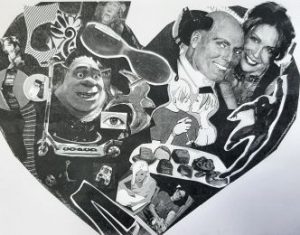If you teach about healthy relationships and are need of an engaging assignment, check out this Healthy Heart Visual. In this project, students get a tech break as they create a hands-on visual representing characteristics needed for a healthy relationship. This semi-old fashioned project has them critically thinking about the meaning behind their selections as they construct and explain their visuals.
as they create a hands-on visual representing characteristics needed for a healthy relationship. This semi-old fashioned project has them critically thinking about the meaning behind their selections as they construct and explain their visuals.
Set
- I begin with the lessons and activities found in this post titled, RelationSHIP Graphic Organizer.
Materials
- Construction Paper in Various Colors
- Glue Sticks & Scissors
- Old Magazines (ask for donations if necessary)
Activities
- Once students have learned the basics about healthy and unhealthy relationships, I assign this project. First they must get a piece of construction paper and a heart template to trace. Once the heart is traced onto the construction paper, students cut it out and write their name on the back.
- Students must peruse old magazines looking for 20 picture and/or symbol examples that they are looking for in a healthy relationship. No words may be used.
- After all have been selected and cut, students glue them onto the hearts in collage style. I ask only that there be little to no overhang so the heart shape is visible and all examples can be seen clearly.
- On a separate piece of paper or on a Google doc that you will need to print, students must critically think about the meanings as they name and explain their choices. Some examples students have shared include:
- Shrek Picture: A relationship should go beyond looks.
- Spiderman: Both should always be willing to help the other out in a time of need.
- Eye: Each should allow the other to see who s/he really is.
- Lion from the Wizard of Oz: Both partners need a certain amount of courage in order to make a serious commitment
- Sweatpants: You should be able to feel comfortable being yourself with that person.
- Gatorade: He should be able to satisfy my needs.
- Bubble Gum: He should be flexible, not only taking, but giving too.
- Hairspray: My guy should be a together kind of guy, not here and there, but have stability.
- After students have written their explanations and glued their examples to the heart, collect them. I always read and graded them pretty quickly so I could use them in a gallery walk the next day.
- Set up the hearts and explanations around the room, giving students prompts to answer as they read through each to see similarities and differences among the class.
- When finished with the gallery walk prompts, bring students back together for a class discussion on their observations and perspectives.
Attachments
- Healthy Heart Visual Instructions & Gallery Walk Prompts (please make a copy if you wish to edit)
- Healthy Heart Template (JPG)
Similar Lessons

